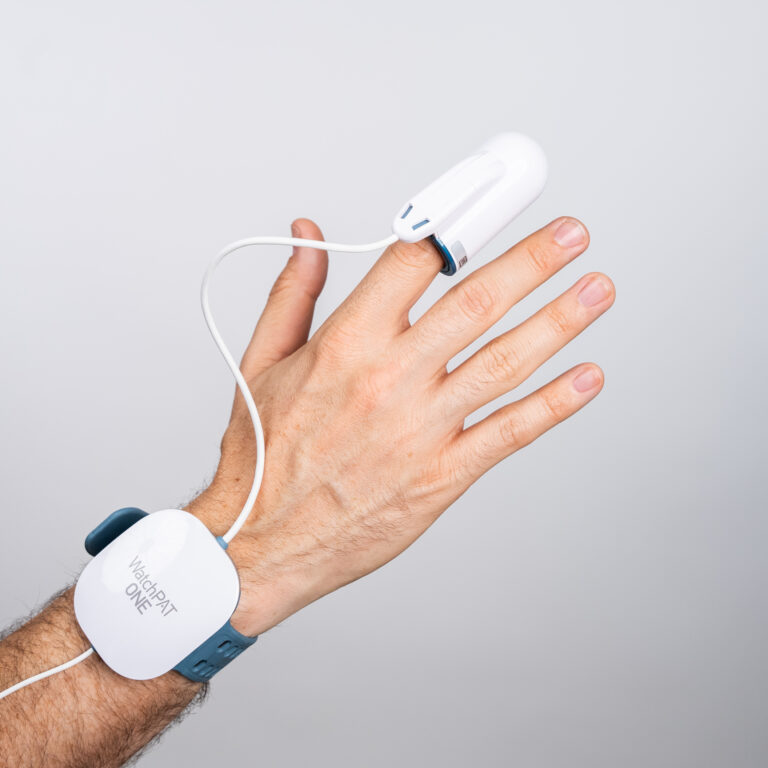When you buy through our links, we may earn a commission. Products or services may be offered by an affiliated entity. Learn more.
Postpartum Insomnia
Caring for an infant can make getting a good night’s sleep feel impossible. More than two thirds of people who give birth experience poor sleep quality during the six months after having a baby, and may have sleep problems for much longer. But it’s not just nighttime wakings and feedings that can leave caregivers feeling exhausted, frustrated, and unable to function normally. In the postpartum period, many people also experience insomnia, a sleep disorder that makes it difficult to fall asleep and stay asleep.
Struggling to Stay Awake? Take an At-Home Sleep Test

our partner at sleepdoctor.com
10% off Home Sleep Tests
Buy Now“Truly grateful for this home sleep test. Fair pricing and improved my sleep!”
Dawn G. – Verified Tester
What Causes Postpartum Insomnia?
The days, weeks, and months following childbirth are a time of intense transition physically, mentally, and emotionally. The changes that occur during this time can affect sleep and contribute to postpartum insomnia.
Patterns That Carry Over From Pregnancy
Sleep difficulties are common during pregnancy, especially during the third trimester, when discomfort, heartburn, the need to urinate frequently, and sleep disorders often interfere with sleep. As a result, problematic behaviors and thought patterns regarding sleep may emerge during pregnancy and persist in the postpartum period.
For example, poor sleep may lead to a habit of taking long afternoon naps, which in turn, make it difficult to fall asleep at night. Similarly, sleep deprivation may cause anxiety about sleep that makes it harder to fall back asleep after a nighttime waking. These patterns may lead to the continuation of insomnia from pregnancy or its development during the postpartum period.
Is Your Sleep a Problem?
Insomnia can also be a result of a variety of underlying issues. Answer three questions to understand if you should be concerned.
Sleep disruptions
New babies typically need to be fed and diapered every two to three hours, which means that their caregivers experience significant sleep disruptions. Sleeping in short increments and on an irregular schedule can disrupt a person’s circadian rhythms, the 24-hour patterns that govern the sleep-wake cycle. Desynchronized circadian rhythms can cause a person to feel sleepy when they want to be awake and awake when they want to sleep.
Hormonal Changes
People experience dramatic fluctuations in their hormones after giving birth—including decreased levels of progesterone and estrogen. Progesterone facilitates relaxation and sleepiness, while estrogen reduces the amount of time it takes to fall asleep and the number of times a person wakes up in the night. So, drops in these hormones may precipitate sleep problems following childbirth.
Pain
Pain and insomnia appear to have a bidirectional relationship during the postpartum period. Many individuals experience pain related to childbirth, breastfeeding, and caregiving, and that pain can make it harder to sleep. But insomnia also appears to increase a person’s chances of experiencing bodily pain in the two years following childbirth, especially when paired with symptoms of depression.
Mental Health Struggles
People who experience sleep problems in the postpartum period have an increased risk of developing depression and anxiety—and, conversely, postpartum mood disorders can aggravate insomnia symptoms. This can create a self-perpetuating cycle. Individuals who have traumatic pregnancies or births may also experience sleep problems related to post traumatic stress disorder.
Symptoms of Postpartum Insomnia
Individuals with postpartum insomnia often:
- Wake frequently in the night
- Feel that their sleep is unrefreshing
- Experience daytime tiredness
- Feel irritable
That said, many of these symptoms can also be the result of ordinary sleep disruptions that come with caring for an infant. A person is likely to have postpartum insomnia—and not simply fragmented or insufficient sleep—if they have trouble sleeping even when they’re given the opportunity to sleep without interruption. Insomnia is also the likely culprit if a person experiences sleep difficulties even if they’ve resolved any physical discomfort and created a good environment for sleep.
People who experience long-term postpartum insomnia may develop depression or anxiety and may experience chronic pain—so the presence of these disorders may point to underlying insomnia.
Treating Postpartum Insomnia
Left untreated, insomnia can negatively impact the health and wellbeing of individuals in the postpartum period, along with the children in their care. The good news is that postpartum insomnia can improve and even resolve with treatment. If you have postpartum insomnia, seek support from a doctor or therapist who can help craft a treatment plan. There are a couple of approaches they might recommend.
Cognitive Behavioral Therapy for Insomnia
One of the most effective treatments for insomnia is cognitive behavioral therapy for insomnia (CBT-I). Usually overseen by a therapist, this approach can help you address thoughts and behaviors that interfere with sleep and cultivate mindsets and practices that promote healthy sleep. If you experience insomnia during pregnancy, consider engaging in CBT-I before giving birth. Research suggests this may reduce the likelihood that you will experience postpartum insomnia, anxiety, and depression.
Light Therapy
Light therapy can help you realign your circadian rhythms and establish a healthy sleep-wake cycle via exposure to bright light at strategic times of day. Often, this is accomplished through the use of a device called a light box. This therapy may be particularly useful if you also are also experiencing postpartum depression.
Improving Postpartum Sleep
There are several steps you can take at home to reduce the impact of and even prevent the sleep difficulties that accompany early parenthood.
- Sleep when you can: Especially in the first few months after birth, try to sleep when your baby sleeps, even during naps. If you’re able to, go to bed early several times a week.
- Ask for help: If possible, get a partner or family member to help in the night or to watch the baby while you nap during the day.
- Go for a morning walk: Exposure to sunlight and exercise might help you feel more alert in the morning, and it may help you sleep better at night.
- Avoid caffeine and alcohol late in the day: While an afternoon cup of coffee may sound tempting, and a beer or glass of wine in the evening may help you relax, both caffeine and alcohol are known to interfere with sleep.
- Seek emotional support: The postpartum period comes with many challenges. Talking to a counselor or joining a support group may help you feel less alone and better equipped to navigate this season of life—and these measures may also benefit your sleep by reducing stress.
Frequently Asked Questions About Postpartum Insomnia
What is “postpartum blues”?
The postpartum blues, also sometimes called “the baby blues,” causes some symptoms of depression, such as sadness, worry, difficulty sleeping, moodiness, crying, and exhaustion—in individuals who have recently given birth. This condition is very common, affecting at least half of individuals who give birth. Unlike postpartum depression, the postpartum blues
tend to:
– Be relatively mild
– Be temporary, usually not lasting for more than two weeks
– Resolve on their own
Is postpartum depression normal after pregnancy?
Postpartum depression is not as common as the postpartum blues, but it affects a significant number of people. Between 10% and 15% of individualsexperience postpartum depression in the 12 months following birth.
Given its prevalence, doctors and pediatricians routinely screen individuals who have given birth for signs and symptoms of postpartum depression. This condition is treatable, so it’s important to discuss your concerns with your provider as soon as possible if you suspect you have postpartum depression.
How long does postpartum insomnia last?
While people do tend to get more sleep once their babies begin sleeping better, usually within a few months of giving birth, for some individuals, sleep quality continues to suffer well beyond that. One study found that two years after childbirth, 41% of individuals
still had insomnia symptoms, such as nonrestorative sleep.
If you are experiencing postpartum insomnia symptoms, don’t wait to get help. Talk to your doctor about treatment options that can help you get better sleep.

Still have questions? Ask our community!
Join our Sleep Care Community — a trusted hub of sleep health professionals, product specialists, and people just like you. Whether you need expert sleep advice for your insomnia or you’re searching for the perfect mattress, we’ve got you covered. Get personalized guidance from the experts who know sleep best.
References
15 Sources
-
Verma, S., Quin, N., Astbury, L., Wellecke, C., Wiley, J. F., Davey, M., Rajaratnam, S. M. W., & Bei, B. (2023). Treating postpartum insomnia: a three arm randomised controlled trial of cognitive behavioural therapy and light dark therapy. Psychological medicine, 53(12), 5459–5469.
https://pubmed.ncbi.nlm.nih.gov/36082412 -
Gallaher, K. G. H., Slyepchenko, A., Frey, B. N., Urstad, K., & Dørheim, S. K. (2018). The Role of Circadian Rhythms in Postpartum Sleep and Mood. Sleep medicine clinics, 13(3), 359–374.
https://pubmed.ncbi.nlm.nih.gov/30098753/ -
Quin, N., Tikotzky, L., Stafford, L., Fisher, J., & Bei, B. (2022). Preventing postpartum insomnia by targeting maternal versus infant sleep: a protocol for a randomized controlled trial (the Study for Mother-Infant Sleep “SMILE”). Sleep advances : a journal of the Sleep Research Society, 3(1), zpab020.
https://pubmed.ncbi.nlm.nih.gov/35156040 -
Viguera, A. (February 2024). Postpartum unipolar major depression: Epidemiology, clinical features, assessment, and diagnosis. In J. Payne, C. Lockwood, & D. Solomon (Ed.). UpToDate.
https://www.uptodate.com/contents/postpartum-unipolar-major-depression-epidemiology-clinical-features-assessment-and-diagnosis -
McBean, A. L., Kinsey, S. G., & Montgomery-Downs, H. E. (2016). Effects of a single night of postpartum sleep on childless women’s daytime functioning. Physiology & behavior, 156, 137–147.
https://pubmed.ncbi.nlm.nih.gov/26776447 -
Smith, C. A., Hill, E., Denejkina, A., Thornton, C., & Dahlen, H. G. (2022). The effectiveness and safety of complementary health approaches to managing postpartum pain: A systematic review and meta-analysis. Integrative medicine research, 11(1), 100758.
https://pubmed.ncbi.nlm.nih.gov/34485073 -
Sivertsen, B., Petrie, K. J., Skogen, J. C., Hysing, M., & Eberhard-Gran, M. (2017). Insomnia before and after childbirth: The risk of developing postpartum pain-A longitudinal population-based study. European journal of obstetrics, gynecology, and reproductive biology, 210, 348–354.
https://pubmed.ncbi.nlm.nih.gov/28126668/ -
Okun, M. L., & Lac, A. (2023). Postpartum Insomnia and Poor Sleep Quality Are Longitudinally Predictive of Postpartum Mood Symptoms. Psychosomatic medicine, 85(8), 736–743.
https://pubmed.ncbi.nlm.nih.gov/37506301/ -
Berens, P. (February 2024). Overview of the postpartum period: Disorders and complications. In M. Prabhu & V. Barss (Ed.). UpToDate.
https://www.uptodate.com/contents/overview-of-the-postpartum-period-disorders-and-complications -
Quin, N., Lee, J. J., Pinnington, D. M., Newman, L., Manber, R., & Bei, B. (2022). Differentiating perinatal Insomnia Disorder and sleep disruption: a longitudinal study from pregnancy to 2 years postpartum. Sleep, 45(2), zsab293.
https://pubmed.ncbi.nlm.nih.gov/34989808/ -
Viguera, A. (2024 February). Postpartum depression: Adverse consequences in mothers and their children. In J. Payne, C. Lockwood, & D. Solomon (Ed.). UpToDate.
https://www.uptodate.com/contents/postpartum-depression-adverse-consequences-in-mothers-and-their-children -
Felder, J. N., Epel, E. S., Neuhaus, J., Krystal, A. D., & Prather, A. A. (2022). Randomized controlled trial of digital cognitive behavior therapy for prenatal insomnia symptoms: effects on postpartum insomnia and mental health. Sleep, 45(2), zsab280.
https://pubmed.ncbi.nlm.nih.gov/34850238/ -
Parry, B. L., Meliska, C. J., Sorenson, D. L., Lopez, A. M., Martinez, L. F., Nowakowski, S., Elliott, J. A., Hauger, R. L., & Kripke, D. F. (2008). Plasma melatonin circadian rhythm disturbances during pregnancy and postpartum in depressed women and women with personal or family histories of depression. The American journal of psychiatry, 165(12), 1551–1558.
https://pubmed.ncbi.nlm.nih.gov/18829869/ -
Balaram, K. & Marwaha, R. (2023, March 6). Postpartum Blues. Statpearls.
https://www.ncbi.nlm.nih.gov/books/NBK554546/ -
Sivertsen, B., Hysing, M., Dørheim, S. K., & Eberhard-Gran, M. (2015). Trajectories of maternal sleep problems before and after childbirth: a longitudinal population-based study. BMC pregnancy and childbirth, 15, 129.
https://pubmed.ncbi.nlm.nih.gov/26031504/

























